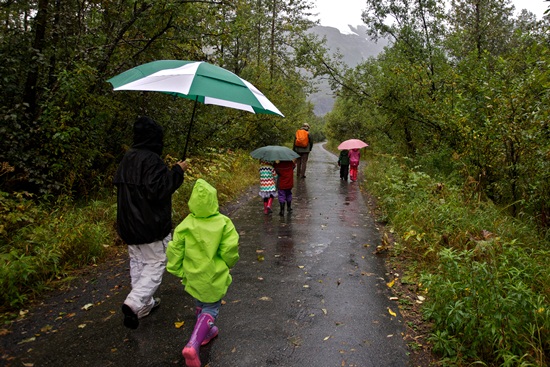The last two weeks have been a whirlwind of activity, with hardly a moment to spare between giving school programs and getting ready for the next new program. Today is the first time I've felt I can take a breath and write in a while because I finally gave my last new lesson at Exit Glacier (yesterday, about the water cycle*). I still have two more programs to give, but I've led them before, so I don't need to frantically pack them into my brain—they're in there somewhere already. The fact that I only have four more days of work at Kenai Fjords hasn't really begun to sink in.
To be honest, when I started this position I wasn't quite sure what I was getting myself into. I'd never worked for the National Park Service. I'd never given a formal interpretive program, and didn't really know what one is supposed to look like. I'd spent some time teaching children outdoors, but never in a particularly formal way, and never in a class setting.
I can safely say that I know a lot more about all of those things, now. Overall, I ended up developing three original interpretive programs, learned and led 8 different education programs (most of them repeatedly) for school groups in the classroom and in the field, and helped mentor 9 young park employees through their summer season. Each of these new experiences taught me some valuable lessons:
Be passionate. Find what you care about and share that passion with the people around you. If you don't care about what you're saying, why should anyone else? This lesson is repeated so frequently that the words sometimes lose their meaning, but standing in front of big groups of people, trying to help them care about your park drives it home pretty quickly.
Know your audience. The more you know about them, the more you can connect with them and present to them in a meaningful way. This goes doubly for different age groups. Young children respond very differently than seniors, and if you don't respect that, you end up with a lot of blank looks. There are some common aspects to all the groups, though. The most important thing is for them to have fun, be amazed and inspired, and want to know more. Just remember that different people have fun in different ways. Which brings me to…
Know when to stop. Enough is enough, and someone worn out with too much information isn't going to have as much fun. Not only that, but they're not going to remember what you told them. This lesson is an ongoing struggle for me. I often catch myself wanting to tell people all about everything, and it can be a challenge to rein that inclination in. But every teaching moment helps me figure out where to draw the line a little more effectively.
Wherever the future takes me, I intend to continue learning and teaching about the natural world. My time here has been a big step on that path.

Photo: NPS / Kailtin Thoresen
*The water cycle is pretty straightforward; water is found in a variety of places (the ocean, clouds, winter snowpack, rivers, etc.) and it continuously flows between all of those places, usually in a predictable way. The water cycle this far north, however, is especially awesome for one big reason: glaciers. When I learned about the water cycle in school in New York, we had the ocean, a few lakes, and one really impressive river to use as our examples. Not once did we take a field trip to a giant, slow-motion river of ice. The icing (or maybe the ice) on the cake is that this trip to Exit Glacier was the first time that a lot of the kids yesterday had ever been that close to a glacier. What a way to learn about Water!
That's not to say that the water cycle isn't interesting in other places, and plenty of people have a great time taking field trips to explore it in their own communities (Scroll down to The Deep, Dark Dungeon to get one class's approach).
